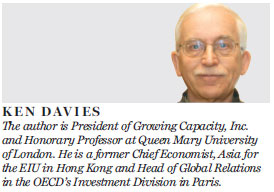Hong Kong's children need other meaningful education experiences
Updated: 2015-05-22 07:30
By Ken Davies(China Daily)
|
|||||||||
Yet again, Hong Kong is up there with the world's best in math and science in its schools. When the World Education Forum opens on May 19 it will be presented with the latest results from the Organization for Economic Cooperation and Development (OECD)'s Programme for International Student Assessment (PISA), announced on May 13, that shows Hong Kong in second place globally.
The rankings are based on math and science tests performed by 15-year-olds in 76 countries across the world. While the OECD claims that this is the most comprehensive international comparison it has yet performed, the countries surveyed do not this time cover the world's two most populous economies, the Chinese mainland and India.
Nevertheless, the results make clear that East and Southeast Asia are at the forefront, with Hong Kong well ahead of countries and regions in the developed world. Yes, Hong Kong is behind Singapore, in first place, but above South Korea (3rd place), Japan and Taiwan (joint 4th place). The United Kingdom is in 20th place and the United States joint 28th place with Italy, well behind Vietnam, which has risen to 12th position.
Once again, these figures will spark fierce debate.
In Hong Kong, many will cite these results in defense of the current education system, claiming that, as it is outperforming the rest of the world, all we need to do is keep on as we are.
The US, Britain and Europe will point in despair to Hong Kong and its neighbors, bewailing the demise of their own education systems and blaming that demise for their deindustrialization and for the manufacturing industry going offshore, which occurred in recent decades.
The counter argument is that these scores do not measure creativity, on which innovation, and therefore industrial survival, will be dependent in the long run. Yes, say the critics, our children score well in these subjects and in other areas where rote learning pays off, but the schools do not give children room to expand their minds and explore new ideas.
Instead of going round and round for ever, repeating the same old charges, why don't we ourselves try to be a bit more creative? How can we do this? Well, you might be pleasantly surprised to learn that the answers can be found in these very pages of China Daily (Hong Kong Edition).
If you read this op-ed page regularly, you ought by now to have taken on board proposals for rounding out Hong Kong's excellent education with expanded experiential learning in arts subjects.
Last week, Nicole Garbellini recommended drama education as a holistic education form that gives an opportunity to experience real life training. Drama, she said, develops skills and abilities such as speaking, critical thinking, self-confidence, time management, self-discipline and teamwork, while exploring emotions, empathy and relationships.
A year or so earlier, I drew attention to the arrival in Hong Kong schools of Venezuela's El Sistema program, in which children of all backgrounds learn to play orchestral music from an early age. As I said at the time, the aim is not primarily to teach music, but to develop social and learning skills that can be used to live life as full human beings. After gaining self-confidence in their often previously under-rated abilities, children become motivated to excel in all school subjects.
So far, so good, you may reply, but when will children find time for these extra-curricular activities, given all the homework they are burdened with?
The answer is twofold. Firstly, if there is too much homework, not allowing time for other meaningful education experiences, then cut down on the homework. Secondly, why should activities like drama and music be de-prioritized by being scheduled outside school hours?
Another objection is that education systems benefit from stability and predictability, not from the "permanent revolution" of reform after reform. Actually, I agree. Trying this, that and the other every year or two is not going to provide the basis for solid achievement. So it makes sense for educational innovation to be incremental and pragmatic, not wholesale change.

(China Daily 05/22/2015 page9)